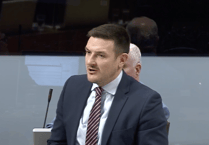Tens of thousands of patients were waiting for routine treatment at the Wye Valley Trust in August, new figures show.
The NHS is facing a difficult winter as the overall waiting list in England climbed for a third month in a row.
NHS England figures show 24,400 patients were waiting for non-urgent elective operations or treatment at Wye Valley NHS Trust at the end of August – down slightly from 24,536 in July, but an increase on 23,571 in August 2023.
Of those, 963 (4%) had been waiting for longer than a year.
The median waiting time from referral at an NHS Trust to treatment at the Wye Valley Trust was 15 weeks at the end of August – the same as in July.
Nationally, 7.6 million treatments were waiting to start at the end of August – a slight increase on July and the highest since October 2023.
Responding to the figures, Nuffield Trust deputy director of research Sarah Scobie said many parts of the NHS are still experiencing "intense pressure".
"The Government needs to act fast on long waits for care, but we are still waiting for more detail on how Labour's promise to increase appointments will improve waiting times. It is also crucial that plans to deal with the backlog of care confront inequalities in access," she added.
Separate figures show 1.6 million patients in England were waiting for a key diagnostic test in August – the same as in July.
At the Wye Valley Trust, 5,624 patients were waiting for one of 13 standard tests, such as an MRI scan, non-obstetric ultrasound or gastroscopy at this time.
Of them, 1,565 (28%) had been waiting for at least six weeks.
Other figures from NHS England show that 71 out of 98 cancer patients urgently referred to the Wye Valley Trust in August received treatment within two months of their referral.
A month previously – when 110 patients were referred – 61 were treated within 62 days.
In August 2023, 67 out of 94 patients were treated within this period.
Oncologist Professor Pat Price, chair of Radiotherapy UK said the cancer waiting list data confirms the "legacy of deadly delays" the Government has inherited, but added there was hope for things to get better.
He said: "We need a comprehensive cancer plan to ensure these innovations and solutions reach those who need them.
"When it comes to cancer, delays to treatment quickly become a matter of life and death.
"The cancer community stands ready to work with the Government to deliver practical and cost-effective solutions to improve NHS cancer care."
Professor Sir Stephen Powis, NHS national medical director, said the NHS has now set out its winter plan, which includes better data reporting and more care in the community, to help patients be seen as quickly as possible.
He said the NHS has delivered over half a million more treatments in 2024 than in 2019, and met the met the cancer faster diagnosis standard for the fourth month in a row in August, but cautioned more must be done to provide "faster, high-quality care," he said.
Minister of State for Health, Karin Smyth, said: "This Government is working at pace to radically reform the NHS through the 10-Year Health Plan, focusing on three big shifts from analogue to digital, sickness to prevention, and hospital to community, so the NHS can be there for us when we need it, once again."



